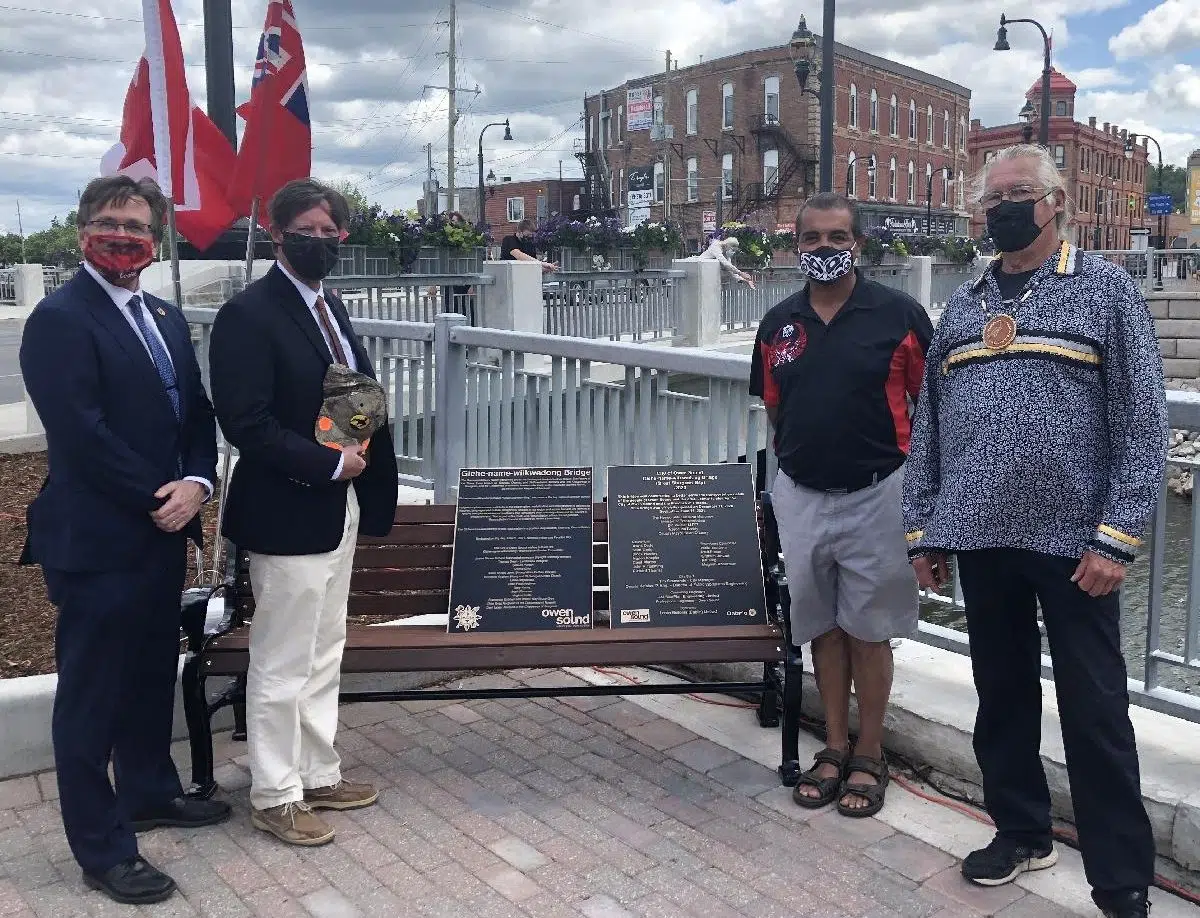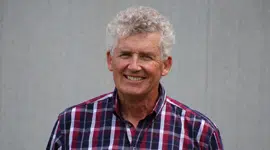The recently reconstructed bridge spanning the Sydenham River at 10th Street in Owen Sound is now officially known as the Giche-name-wiikwedong Bridge.
A ceremony to unveil plaques and celebrate the bridge dedication was held Monday morning in Owen Sound on the 25th anniversary of National Indigenous Peoples Day in Canada.
The name of the bridge is in the Anishinaabemowin language is in honour of the community’s Indigenous history on traditional territory of the Anishinabek Nation: The People of the Three Fires known as Ojibway, Odawa and Pottawatomie Nations and Saugeen Ojibway Nation.
Giche-name-wiikwedong translates as Great Sturgeon Bay. The name of the bay before contact between European settlers and Indigenous ancestors.
Owen Sound Mayor Ian Boddy, Bruce-Grey-Owen Sound MPP Bill Walker, Chippewas of Nawash Unceded First Nation Chief Greg Nadjiwon and Saugeen First Nation Chief Lester Anoquot were on hand at the bridge dedication ceremony just south of the bridge at 1st Avenue West Monday morning and made remarks.
Nadijwon said it is appropriate to have the bridge named in this language at this particular place, recalling history of Indigenous ancestors in the area.
“In 1857, as a people, as a nation, we became one of the first displaced people of this country,” Nadijwon explained. “Our village started right here and went out, almost reaching Presqu’ile … some of the members that were displaced in 1857 from this land, were again displaced in 1862 from the shores of Colpoy’s Bay.”
“I harp about it over and over again, how the reason why we have the issues we have in this territory, is because our history isn’t included in the curriculum of this country,” continues Nadijwon, “Of this territory, why we have rights, why we are holders. And it has to happen.”
Nadjiwon later added: “Let’s work together to make sure that we as a people are part of the history of this great country that is recognized as Canada.”
Anoquot spoke of a need for healing and reconciliation as a country, and as a people together. He believes the more Indigenous struggles are recognized, the more opportunity there will be to work together.
“And address a lot of these outstanding issues we face as a people,” Anoquot said. “And, hopefully collectively going forward for the future of our young people in a positive manner, provide them with a future of hope and prosperity.”
The Chippewas of Saugeen Chief said he suffered inter-generational trauma as both his parents were residential school survivors.
“My childhood wasn’t all that great,” Anoquot explained. “But with the help of non-native community I managed to get my education. So with that, I know that collectively as a country, unifying ourselves together, that collectively moving forward we can do it for the benefit of our children and the unborn.”
Owen Sound’s mayor thanked Anoquot and Nadjiwon for their friendship and said “we are proud and excited to acknowledge, share and celebrate this day with them.”
Boddy explained the city chose June 21 for the dedication of the bridge in recognition of the 25th National Indigenous Peoples Day in Canada. He said our community honours the heritage, contribution, sacrifices and diverse cultures of the First Nation, Inuit and Métis communities across Canada.
“The Truth and Reconciliation Commission in Canada was established in 2008 by Prime Minister (Stephen) Harper. In 2015, the commission released its report after hearing from thousands of residential school survivors. The report had 94 calls to action,” Boddy explained. “In the last few weeks, we heard that news from Kamloops, which I think has helped drive through to many Canadians what the commission learned. If we had read in detail the commission when it came out, we would not have been surprised a couple of weeks ago as so many of us were.”
Boddy added: “Canada does not have a perfect history. No country does. However, there’s few other countries in this world where we can have the conversation we are having today about our history and strive to make those changes.”
MPP Walker brought greetings on behalf of Premier Doug Ford and Ontario’s Minister of Indigenous Relations and Reconciliation Greg Rickford.
“I think it’s very symbolic when we come to something today, a bridge,” Walker said. “An asset that lets us join, lets us meet communities, lets us meet people, allows us to always work forward, to meet together and to find ways to work together.”
Construction on the Giche-name-wiikwedong Bridge was completed last year. It officially opened on Dec. 11, 2020.






